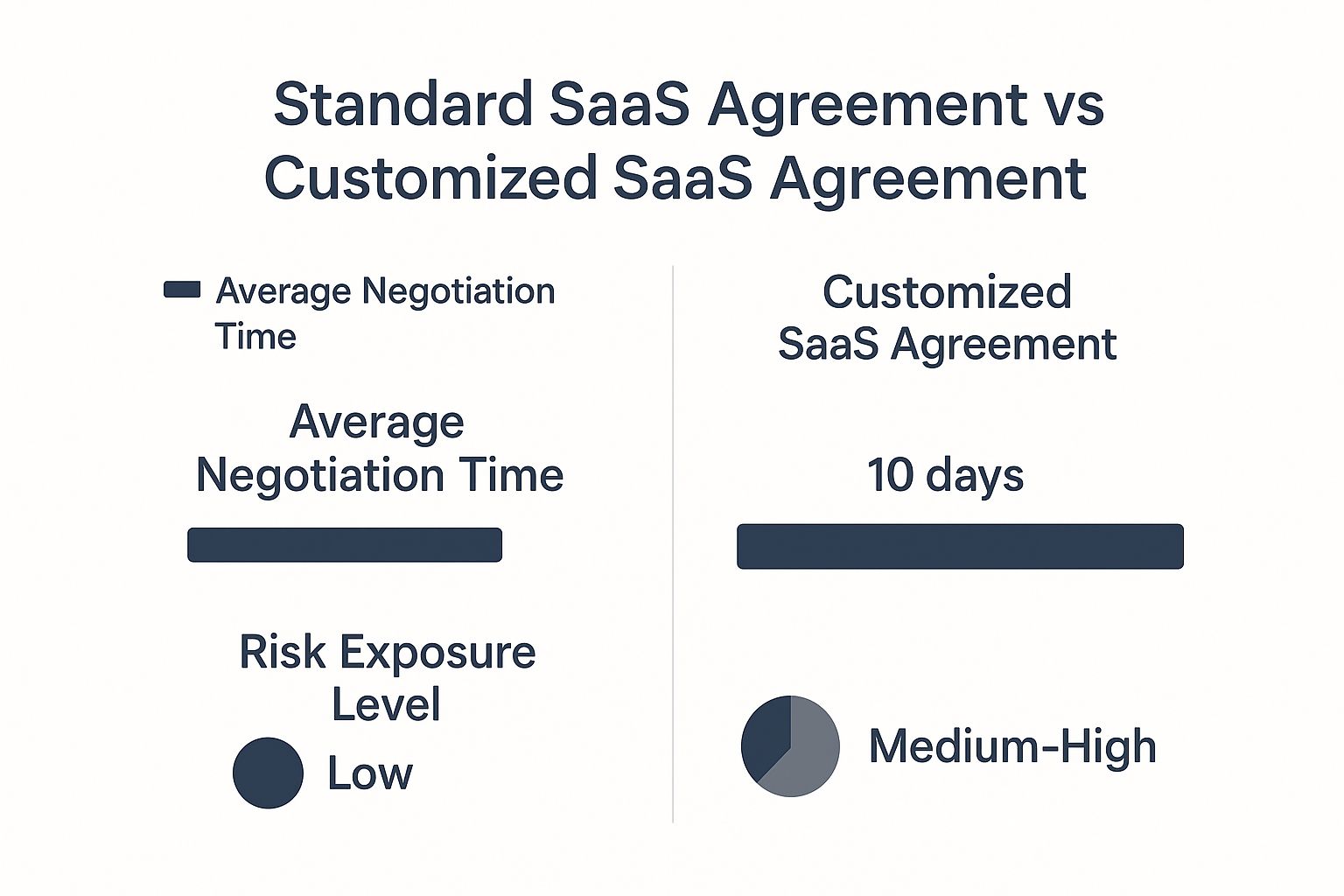Why Your Cloud Business Needs a SaaS Agreement Attorney
The cloud computing landscape has changed the way businesses operate, with Software as a Service (SaaS) at the forefront. This presents incredible growth opportunities but also introduces complex legal considerations. This is where a SaaS agreement attorney becomes essential.
Traditional business lawyers might understand general contract law, but they often lack the specialized knowledge required for the intricacies of SaaS agreements. These agreements aren't just digital versions of traditional software licenses. They govern ongoing provider-customer relationships, covering a range of crucial issues often missed by general practitioners.
Understanding the Nuances of SaaS Agreements
SaaS agreements must address the ever-changing nature of cloud services, including aspects like subscription models, data security, intellectual property rights, and service level agreements (SLAs). The global reach of many SaaS businesses adds another layer of complexity, requiring agreements compliant with international regulations. Furthermore, rapid technological advancements necessitate adaptable agreements.
This market's rapid growth emphasizes the increasing need for specialized legal counsel. The global SaaS market, valued at approximately $197 billion in 2023, is projected to reach $232 billion by 2025, with an estimated 72,000 SaaS companies worldwide. This growth underscores the importance of robust SaaS agreements that protect both providers and customers.
Protecting Your Interests and Fostering Customer Trust
A specialized SaaS agreement attorney helps craft agreements balancing your business goals with customer expectations. They ensure your contracts:
- Clearly define subscription terms: Addressing pricing, renewals, and cancellations.
- Protect your intellectual property: Safeguarding software code, trademarks, and other assets.
- Establish robust data security measures: Complying with privacy regulations and building customer trust.
- Define clear service level agreements: Setting expectations for performance and uptime.
- Establish a fair dispute resolution process: Minimizing costly litigation risks.
This attention to detail can distinguish a thriving SaaS business from one facing legal issues. You might be interested in How to master legal advice for your business for more information.
Turning Legal Challenges into Competitive Advantages
A skilled SaaS agreement attorney not only protects you from legal risks but also helps transform those challenges into competitive advantages. By creating clear, comprehensive, and customer-focused agreements, you can:
- Enhance customer confidence: Demonstrating your commitment to transparency and fair practices.
- Streamline the sales process: Reducing onboarding friction and accelerating deal closures.
- Reduce customer churn: Providing clear terms and fostering long-term relationships.
- Increase your company's valuation: Showcasing strong legal foundations to potential investors.
A strong SaaS agreement is more than a legal requirement; it's a strategic business decision. It allows you to focus on innovation and growth, confident that your legal interests are secured.
Unique Complexities of SaaS Agreements Revealed
SaaS agreements aren't simply digitized versions of traditional software licenses. They represent a fundamental shift in how software is delivered and used, creating unique legal intricacies that demand specialized attention. These agreements govern ongoing relationships, not one-time transactions, and must account for the dynamic nature of cloud-based services. Understanding cloud infrastructure is vital for SaaS businesses. Learn about the power of .
Subscription Economics and International Compliance
One key complexity lies in the subscription-based model. SaaS agreements must clearly define payment terms, renewal processes, and cancellation policies, all while adhering to potentially varying international regulations.
Automatic renewals, a common feature in SaaS, are subject to specific legal requirements in many jurisdictions. These requirements often include clear disclosure and easy cancellation options. Additionally, navigating data privacy laws across different countries adds a layer of complexity that demands expert guidance.
Data Processing, Performance, and Intellectual Property
Beyond subscription economics, SaaS agreements grapple with complex issues surrounding data. Data processing provisions must outline responsibilities regarding data security, access, and ownership. Clearly defining these responsibilities is crucial for both the SaaS provider and the customer.
Performance metrics, often defined through SLAs (Service Level Agreements), are crucial for setting expectations and ensuring accountability. These metrics provide a framework for measuring the performance of the SaaS application and addressing any performance issues. Furthermore, protecting intellectual property in a cloud environment presents unique challenges, requiring carefully crafted provisions to safeguard valuable software code and related assets.
Liability Frameworks and Expert Navigation
Establishing clear liability frameworks is paramount in SaaS agreements. These frameworks must address potential service disruptions, data breaches, and other risks inherent in cloud-based services. This is where the role of a specialized SaaS agreement attorney becomes crucial.
With the increasing complexity of SaaS agreements, having a legal expert to navigate these intricacies is more important than ever. Specialized SaaS attorneys have become increasingly essential, providing expertise in drafting and negotiating these multifaceted contracts. This includes addressing issues like subscription models, intellectual property, and international regulations. Explore this topic further.

They craft provisions that protect your business while reassuring your customers. These attorneys address complex issues and help ensure compliance in this dynamic business model, offering valuable support for both providers and users of SaaS solutions.
Finding Your Ideal SaaS Agreement Attorney Partner
Not all legal expertise is the same, especially when it comes to the complexities of SaaS. Finding an attorney who understands the intersection of technology, business models, and law is essential for your SaaS business's success. This requires more than just a basic understanding of contracts; it demands specialized knowledge of the SaaS landscape.
Identifying a True SaaS Legal Partner
Exceptional SaaS legal partners do more than just draft documents. They become strategic advisors, guiding you through the challenges of this unique business model. They have a deep understanding of:
Subscription economics: This includes recurring billing, renewal terms, and strategies for reducing customer churn.
Data security and privacy: They understand the complexities of the GDPR, , CCPA, , and other relevant regulations.
Intellectual property protection: They know how to protect your software code and other valuable assets.
International compliance: They can navigate the legal requirements of different countries if your SaaS operates globally.
Evaluating Potential Attorneys: Key Questions and Red Flags
Finding the right SaaS agreement attorney requires careful evaluation. Ask potential attorneys about their experience with:
Specific SaaS platforms or technologies: Do they have expertise relevant to your specific niche?
Negotiating complex SaaS contracts: Have they successfully handled similar deals before?
Data breach response and prevention: Can they advise you on minimizing risks and managing incidents?
Be wary of attorneys who:
Lack specific SaaS experience: General business lawyers may miss crucial nuances specific to SaaS.
Overlook data security: In the SaaS world, data protection is paramount. Neglecting this is a serious red flag.
Offer only standardized contracts: Your SaaS agreement should be tailored to your unique business needs.
To illustrate the differences between standard and customized agreements, take a look at the infographic below:

As the infographic shows, while standard agreements may be faster to negotiate, they often come with a much higher risk compared to customized agreements designed for your specific requirements.
Matching Legal Services to Your Business Stage
Different legal service models suit different business stages. Startups might find budget-friendly options through online legal platforms. Larger enterprises often benefit from dedicated in-house counsel or established law firms.
To help you find the right fit, we've put together a comparison table outlining the key differences between traditional law firms and online legal platforms for SaaS legal services:
This table compares the key differences between traditional law firms and online legal platforms when seeking SaaS agreement attorney services.
| Service Aspect | Traditional Law Firms | Online Legal Platforms |
|---|---|---|
| Cost | Higher | Lower |
| Speed | Slower | Faster |
| Customization | Highly Customizable | Standardized or Template-Based |
| Expertise | Specialized and Experienced Attorneys | Varied Levels of Expertise |
| Communication | Direct and Personalized | Primarily Online/Automated |
| Accessibility | Less Accessible | More Accessible |
Key takeaway: While traditional firms offer deep expertise and customization, online platforms provide more affordable and accessible options, particularly beneficial for startups. Larger companies might prioritize the specialized knowledge and personalized service of established firms.
The options for accessing legal help for SaaS businesses have expanded significantly, reflecting the increasing need for affordable and effective legal services tailored to SaaS contracts. Learn more about . At Cordero Law, we provide personalized legal services tailored to SaaS businesses of all sizes, ensuring you receive the expertise and support you need without overspending. Whether you're a bootstrapped startup or a scaling enterprise, finding the right legal partner is a crucial investment in your long-term success. Contact us today to discuss your specific needs.
Essential Components of Rock-Solid SaaS Agreements
Beyond basic terms and conditions, a carefully constructed SaaS agreement protects your business and builds customer trust. This section breaks down the crucial components these contracts need to safeguard your interests in the cloud. We'll explore how effective agreements tackle key areas like subscription models, service levels, and data governance, using real-world examples to illustrate best practices.
Defining the Subscription Model Clearly
A well-drafted SaaS agreement begins with a clear definition of the subscription model. This includes specifying the different subscription tiers offered, the features included in each tier, and the pricing. For example, a SaaS provider might offer basic, premium, and enterprise tiers, each with increasing functionality and corresponding price points.
Beyond pricing, the agreement should detail the payment terms, including accepted methods, billing cycles, and any automatic renewal provisions. Automatic renewals require special attention, ensuring compliance with regulations regarding clear disclosure and easy cancellation. The agreement must also outline procedures for upgrades, downgrades, and cancellations to minimize potential disputes and ensure a smooth customer experience.
Service Level Agreements and Performance Metrics
Service Level Agreements (SLAs) are essential to any robust SaaS agreement. They set clear expectations for service availability, performance, and support. For example, an SLA might guarantee 99.9% uptime and specify response times for support requests. This assures customers and establishes accountability.
Performance metrics, often part of SLAs, provide measurable standards for evaluating service quality. These metrics can include uptime, response times, error rates, and other relevant performance indicators. Defining these metrics provides transparency for assessing service delivery and addressing performance shortcomings.
Data Governance and Intellectual Property Protection
Data governance is critical in the SaaS world. Your agreement must address data ownership, security, and privacy. This includes specifying how customer data is collected, used, protected, and disposed of. Compliance with data privacy regulations like and is essential, and your agreement should reflect this commitment.
Intellectual property (IP) protection is equally vital. Your SaaS agreement should state that you retain ownership of the software's underlying code, trademarks, and other intellectual property. This protects your assets and prevents unauthorized use or distribution.
Limiting Liability and Resolving Disputes
A robust SaaS agreement includes provisions to limit your liability. This might involve capping liability for certain damages or excluding liability for consequential or indirect losses. While limiting liability is important for risk management, ensure these limitations are reasonable and legally enforceable.
Finally, a comprehensive SaaS agreement establishes a clear process for resolving disputes. This often involves outlining steps for negotiation, mediation, or arbitration. A defined dispute resolution process helps avoid costly litigation. You might be interested in: How to master contract negotiation strategies. This proactive approach reinforces customer trust and contributes to a smoother business relationship. By addressing these essential components thoughtfully, your SaaS agreement becomes a powerful tool for protecting your business, building customer confidence, and fostering long-term success.
How SaaS Agreement Attorneys Shield Your Business

Specialized legal counsel for SaaS agreements provides much more than simple document drafting. These attorneys act as a protective barrier for your business, guiding you through the intricacies of the SaaS world. This proactive strategy emphasizes risk mitigation, compliance, and growth facilitation, rather than simply reacting to legal problems. A SaaS agreement attorney becomes a valuable partner in addressing the unique challenges inherent in the SaaS industry.
Preventing Costly Disputes Before They Arise
A key benefit of engaging a SaaS agreement attorney lies in their ability to prevent disputes. By developing clear and thorough agreements, they reduce ambiguity and set clear expectations for both the SaaS provider and the customer. This proactive method helps avoid misunderstandings that could potentially escalate into expensive legal battles.
For instance, precisely defined service level agreements (SLAs) and data processing provisions can prevent conflicts regarding performance and data management. Experienced SaaS agreement attorneys anticipate potential friction points and address them proactively within the contract.
This foresight can save your business significant time and resources by resolving potential conflicts before they escalate. This is particularly critical in the SaaS industry, where maintaining strong, ongoing customer relationships is essential.
Navigating Compliance Across Multiple Jurisdictions
SaaS businesses often operate across various jurisdictions, each with its own specific regulations. A SaaS agreement attorney helps you navigate these complex legal requirements, ensuring your agreements comply with data privacy laws, international regulations, and other applicable statutes. This is particularly important with regulations like the General Data Protection Regulation (GDPR) and the California Consumer Privacy Act (CCPA), where non-compliance can result in substantial penalties.
Furthermore, these attorneys keep abreast of evolving legal standards, guaranteeing your agreements remain compliant. This continuous support provides peace of mind, allowing you to concentrate on core business functions. This can be a considerable advantage in today's rapidly changing legal landscape.
Creating Contract Frameworks for Business Expansion
As your SaaS business grows, so do your legal needs. A SaaS agreement attorney helps you establish contract frameworks that are scalable and adaptable. They can assist with structuring agreements for new markets, managing renewals and cancellations effectively, and incorporating necessary updates as your business expands.
A skilled SaaS agreement attorney can help develop standardized contract templates adaptable for different customer segments or geographic locations. This streamlines the contracting process and ensures consistency across all agreements. They can also provide strategic advice for international expansion, helping you navigate the legal nuances of conducting business globally.
To illustrate the value SaaS agreement attorneys bring, let's examine some common business risks and how they can be mitigated:
Key Business Risks Mitigated by SaaS Agreement Attorneys
| Business Risk | Potential Impact | How SaaS Agreement Attorneys Mitigate |
|---|---|---|
| Data Breaches | Financial loss, reputational damage, legal liability | Implement robust data security provisions, define responsibilities, and ensure compliance with data privacy regulations. |
| Intellectual Property Infringement | Loss of competitive advantage, legal battles | Clearly define ownership and usage rights for intellectual property, establish procedures for protection, and address potential infringement scenarios. |
| Contract Disputes | Financial costs, strained customer relationships, legal battles | Draft clear and comprehensive agreements, address potential points of contention proactively, and establish clear dispute resolution mechanisms. |
| Non-Compliance with Regulations | Fines, legal action, reputational damage | Ensure agreements comply with all applicable regulations, including data privacy laws and international requirements. |
By proactively addressing these key business risks, SaaS agreement attorneys safeguard your business and allow you to capitalize on growth opportunities. Partnering with a SaaS agreement attorney is a strategic investment in your business's long-term security and success.
Critical Moments to Engage Your SaaS Agreement Attorney

Timing is everything when it comes to legal support for your SaaS business. Being proactive, rather than reactive, in engaging a SaaS agreement attorney can save you significant time, money, and headaches later. This section highlights the key moments where specialized legal counsel delivers the most value.
Business Formation: Laying a Solid Foundation
From the very beginning, a SaaS agreement attorney can help you structure your business effectively. This includes selecting the appropriate entity type (LLC, corporation, etc.), drafting crucial documents like operating agreements, and advising on initial intellectual property protection. These early decisions have lasting impact, making expert legal guidance essential.
Market Expansion: Navigating New Territories
Expanding your market introduces new legal complexities. These can range from international data privacy regulations like GDPR to varying contract enforcement standards. A SaaS agreement attorney can help you navigate these challenges, ensuring compliance and minimizing risks. They can also tailor your SaaS agreements to meet specific market needs.
Product Evolution: Protecting Your Innovation
As your product grows and changes, so should your legal strategy. A SaaS agreement attorney helps protect your intellectual property as you develop new features, integrate third-party technologies, or modify service offerings. They can also advise on licensing agreements, open-source software considerations, and other relevant legal aspects of product development. Understanding the impact of technical SEO on your software's visibility is also crucial; learn more about robust .
Funding Rounds: Securing Your Future
Funding rounds often involve complex negotiations and due diligence. A SaaS agreement attorney helps prepare you by reviewing term sheets, negotiating investor agreements, and ensuring your legal documentation is organized. They can also advise on equity structures, intellectual property assignments, and other important legal aspects of fundraising.
Customer Scaling: Managing Growth Effectively
As your customer base expands, managing contracts and ensuring compliance becomes more challenging. A SaaS agreement attorney can help you build scalable contract management processes, implement strong data security measures, and navigate the legal aspects of customer onboarding and retention. For more information about legal guidance for growing businesses, check out this article on legal help for small businesses.
Building an Ongoing Relationship: Reaping Compounding Benefits
An ongoing relationship with a SaaS agreement attorney provides numerous benefits. They develop a deep understanding of your business, allowing them to offer proactive and strategic legal advice tailored to your specific needs. This proactive approach prevents costly legal interventions later and ensures your legal strategy aligns with your business goals for sustained growth.
Transforming Legal Expertise Into Business Advantage
Beyond simply mitigating risk, a SaaS agreement attorney can offer a significant strategic advantage. Forward-thinking SaaS companies use these legal partnerships to gain a competitive edge in today's busy marketplace. This isn't just about legal documents; it's about using legal expertise to fuel business growth.
Well-Crafted Agreements as Business Tools
Well-crafted agreements, guided by a specialized SaaS agreement attorney, become much more than just legal safeguards. They evolve into powerful tools for several key areas:
Sales Enhancement: Clear, concise, and customer-friendly agreements build trust and streamline the sales process. This leads to faster deal closures and higher sales conversions.
Customer Retention: Agreements that proactively address customer needs and concerns foster long-term relationships, reducing churn and building valuable customer loyalty.
Valuation Enhancement: A strong legal foundation demonstrates stability and reduces risk, making your company more attractive to investors and boosting its overall value.
For instance, clearly defined not only set performance expectations but also showcase a commitment to customer satisfaction – a key differentiator in any competitive market.
Facilitating Growth Through Strategic Contract Structuring
SaaS agreement attorneys specializing in this field help structure contracts that facilitate, rather than hinder, business growth. This is especially crucial in dynamic markets where inflexible contracts can stifle innovation.
Seamless Onboarding: Efficient and user-friendly onboarding is crucial for acquiring and retaining customers. A well-structured agreement simplifies this process, creating a positive first impression.
Friction-Free Renewals: Clear renewal terms and automated processes reduce administrative overhead and ensure consistent revenue streams, freeing your team to focus on acquiring new customers and expanding market reach.
Measuring the ROI of Legal Counsel
The return on investment (ROI) of a SaaS agreement attorney can be measured in several tangible ways:
Reduced Legal Disputes: Fewer disputes translate to lower legal costs and less time spent on conflict resolution.
Improved Contract Negotiation Outcomes: Skilled attorneys can negotiate favorable terms, protecting your interests and maximizing value.
Enhanced Customer Satisfaction: Clear agreements and well-defined processes lead to happier customers and improved retention rates.
Increased Company Valuation: A solid legal foundation demonstrates a commitment to risk management, making your company more attractive to investors.
Investing in specialized legal counsel translates directly into measurable business benefits, contributing to both short-term gains and long-term stability.
Integrating Legal Strategy into Business Planning
To maximize the strategic advantage of your SaaS agreement attorney, integrate legal strategy into your broader business planning. This involves a few key steps:
Early Legal Involvement: Involve your attorney from the outset, not just when problems arise. Proactive legal planning prevents costly reactive measures later.
Ongoing Communication: Maintain regular communication with your attorney to discuss business developments and ensure alignment between your legal strategy and your goals.
Strategic Collaboration: View your attorney as a strategic partner, not just a legal advisor. Collaborate on key decisions to ensure legal considerations are incorporated into every aspect of your business.
By incorporating these strategies, you can transform legal expertise into a powerful driver of business success in the competitive SaaS landscape.
Ready to protect your SaaS business and gain a competitive edge? Contact Cordero Law today for expert legal guidance tailored to your specific needs. Visit Cordero Law to learn more.
